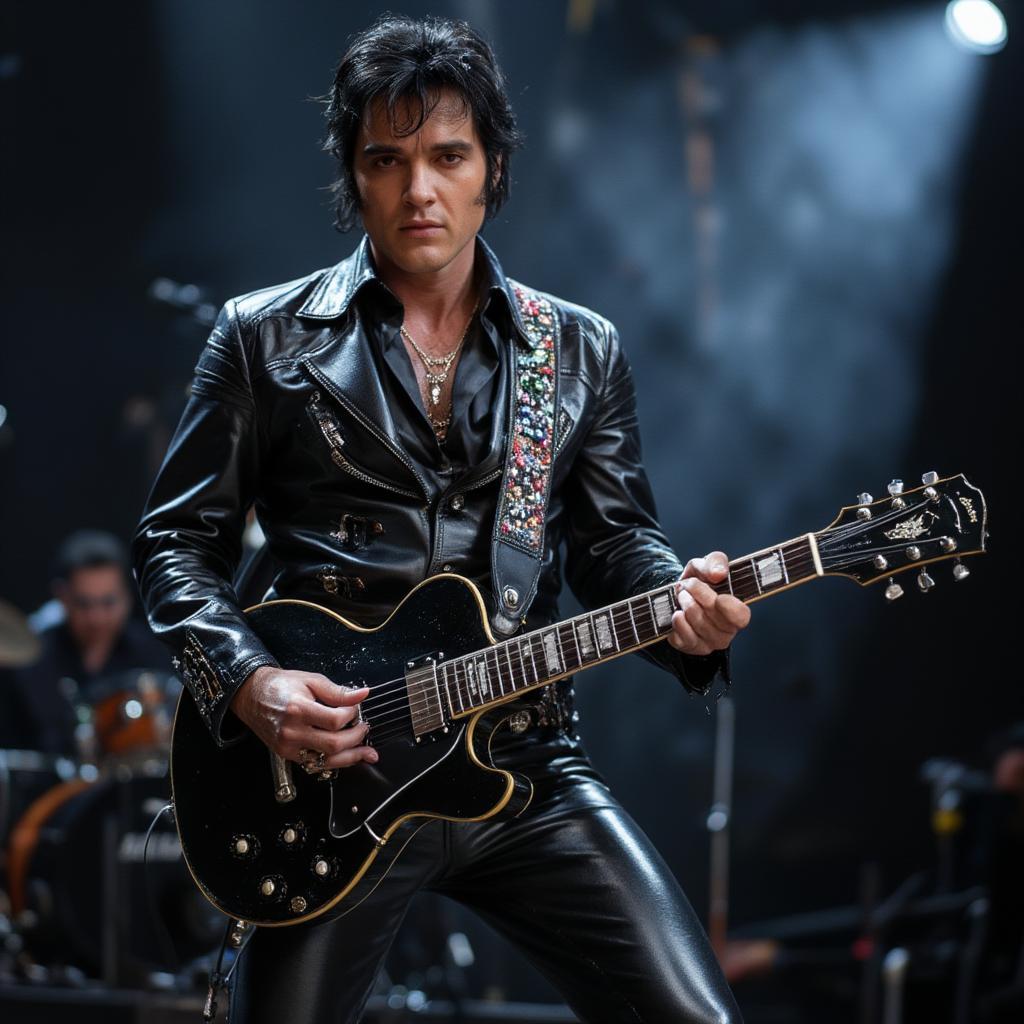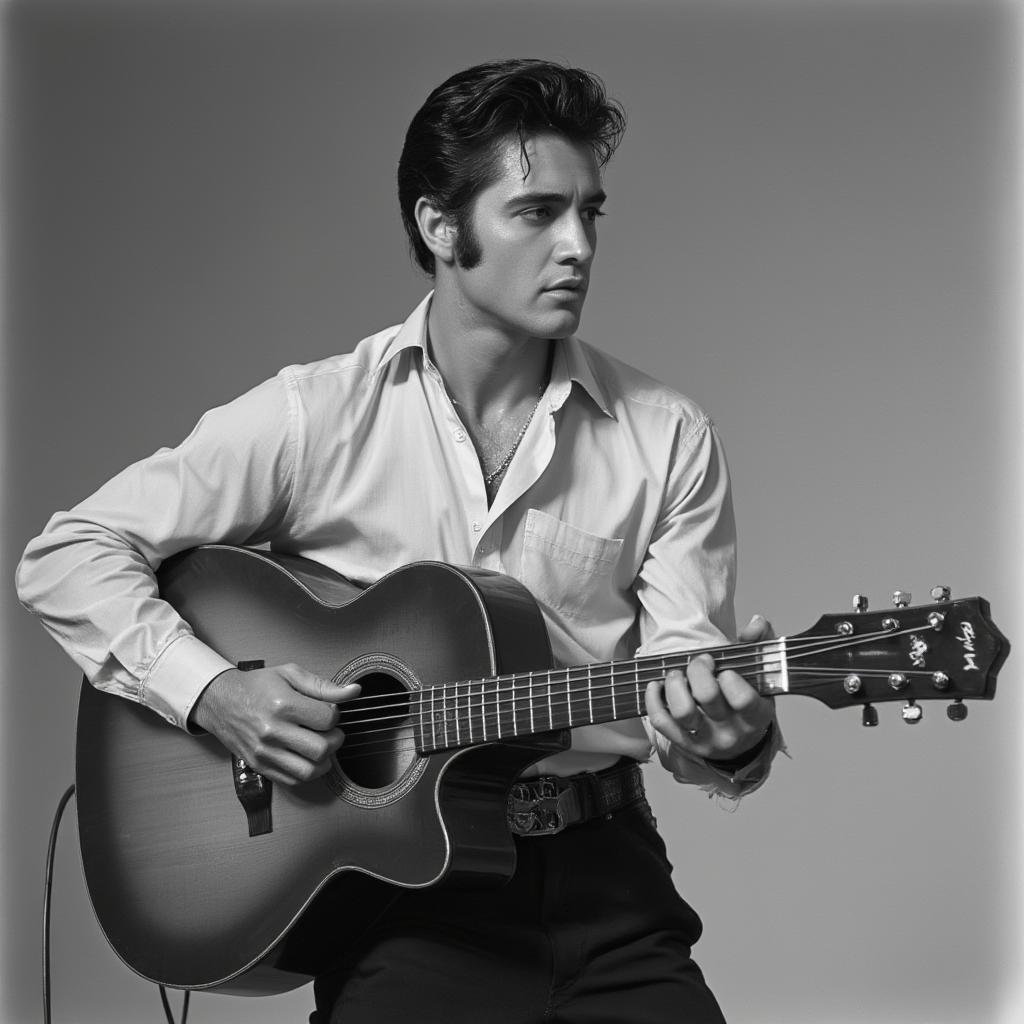Elvis Protest Songs: Unearthing the King’s Rebellious Side

While Elvis Presley is often remembered for his hip-swiveling dance moves and heartthrob ballads, a deeper dive into his discography reveals a lesser-known facet: the King’s engagement with social and political commentary through music. Forget the rhinestones and the Vegas glitz for a moment; let’s explore the songs where Elvis’s rock and roll spirit intersected with a rebellious undercurrent, and how these tracks resonate even today. The idea that Elvis was merely a sanitized, apolitical icon is far from the truth when you begin to look beneath the surface. elvis jailhouse rock showcases his rebellious side, but his protest songs offer an even deeper look.
More Than a Pretty Face: Elvis’s Social Commentary
It’s easy to pigeonhole Elvis as just the pelvis-shaking performer, but he was also a man of his time, absorbing the world around him. While he wasn’t known for overtly political stances like some artists, his choices in material often reflected the anxieties and concerns of the era. Some of his songs tackled social issues with subtlety, using metaphor and allegory to address the problems at hand. The way he delivered these messages, combined with his raw talent and influence made him a voice for the unspoken feelings of his generation.
How Did Elvis Express Protest Through Music?
Elvis wasn’t a traditional protest singer; he didn’t write anthems for civil rights marches or explicitly denounce the government. Instead, he used his platform to bring attention to the injustices and societal problems he observed in his everyday life. He did this in a few ways:
-
Choosing Material: Elvis was known for picking songs that resonated with him personally, and this often led him to choose songs that, while not blatant political statements, reflected the social upheaval of the 1960s.
-
Emotional Delivery: His raw vocal style and passionate delivery imbued these songs with a sense of urgency and conviction, making the message hit harder than lyrics alone might suggest. He made sure the feelings in the song resonated with the listener.
-
Genre Fusion: By blending blues, gospel, and country music into his unique brand of rock and roll, Elvis created a sonic landscape that was inherently rebellious, speaking to the mixing and matching of society that was going on at the time.
Examples of Elvis’s “Protest” Songs
It’s essential to note that Elvis himself might not have considered these “protest songs.” They are more accurately described as songs of social awareness, that tackle difficult topics. These examples demonstrate his capacity to convey strong emotions and social commentary through his unique musical style. Let’s look at some of them:
-
“If I Can Dream”: This powerful ballad, featured on the elvis 68 comeback special movie, was a plea for peace, equality, and understanding. Coming in the wake of the assassinations of Martin Luther King Jr. and Robert F. Kennedy, the song, with its soaring vocals, became an anthem for hope and change. It’s a direct call for social change, not just a song about love.
-
“In the Ghetto”: This narrative song tells the heartbreaking story of a young man born into poverty in the Chicago slums, destined to repeat the cycle of struggle. It’s a powerful statement about the socioeconomic inequities prevalent in American society, and it’s a very poignant story.
-
“Change of Habit”: From the movie of the same name, this song, whilst seemingly simple, actually addresses the internal struggles of individuals caught in the throes of change. Though not overt, it speaks to broader themes of personal and societal transformation, and speaks to how Elvis had changed as an artist.
-
“Rubberneckin'”: While the song is more of a dance number, it carries with it the message of judgement and social norms. The message that being different will lead to judgement, but it’s always important to be yourself is always important.
The Context Matters: The Times Elvis Lived In
Understanding Elvis’s music requires understanding the social and political landscape of his time. The 1950s and 60s were turbulent times in America, marked by the Civil Rights movement, the Vietnam War, and growing social unrest. These events undoubtedly influenced the music being created at the time. Even though Elvis didn’t take a public stand, the music he chose resonated with these movements.
-
Civil Rights Movement: Elvis grew up in the South, a region deeply entrenched in racial segregation. While he wasn’t an activist, his music broke down racial barriers by drawing heavily from African American blues and gospel traditions.
-
The Vietnam War: The war divided the nation, and many songs emerged that reflected the growing anti-war sentiment. Whilst Elvis served in the army, his music seemed to express a desire for peace.
-
Social Change: From the changing sexual mores to women’s rights, the status quo was being challenged across the board. Elvis was a pioneer who dared to break the mold, and his music seemed to reflect the times.
“Elvis was never afraid to express his feelings through his music,” says Dr. Vivian Holloway, a cultural historian specializing in the intersection of music and social change. “While not explicitly political, his song choices often reflected the deep-seated anxieties and hopes of a generation navigating turbulent times.”
Why Elvis’s “Protest” Songs Still Matter Today
The messages of these “protest” songs are still very relevant. The themes of poverty, social injustice, and the quest for peace continue to resonate in today’s world. This is why it’s so important that “Welcome Shock Naue” keeps his legacy alive.
-
Timeless Themes: The issues Elvis addressed in his music, though relevant to his time, are still prevalent in the world. The struggle for social equality and the desire for peace are things that people around the world still strive for.
-
Emotional Connection: Elvis’s music, with its honest and raw emotion, transcends time. It continues to touch the hearts and minds of people of all ages and cultures. It’s a testament to the power of music to connect us all on a human level.
-
Historical Perspective: Listening to Elvis’s music from the 60’s gives us an insight into what the world was like at the time. Learning the perspective from the past can help us navigate our future.
The “Welcome Shock Naue” Approach
As a guardian of Elvis’s legacy, it’s my mission to ensure that Welcome Shock Naue honors all aspects of his artistry. We’ll be digging deep into the nuances of his music, shining a light on the songs that reveal his engagement with the social and political currents of his time. We aim to show the world the full depth of his artistry, and not just the glamorous image he was known for. We want to show you he was more than just a showman.

The Rebellious Spirit of Elvis in the 60s
The 1960s were a period of immense social and cultural upheaval, and Elvis’s music, although not always directly about political events, reflected the mood of the time. He may not have been on the frontlines of the demonstrations, but he was able to speak to the hopes and desires of the generation that was trying to be heard.
A Change In Sound
The sonic landscape of his music evolved in the 1960s. While still grounded in rock and roll, it reflected the changing times.
-
Deeper Lyrics: Elvis delved into more introspective themes, using his powerful voice to highlight societal problems, like in “In the Ghetto”
-
Musical Experimentation: Elvis wasn’t afraid to incorporate different styles, which can be seen in the way his gospel influence would be heard in his later songs, like “If I Can Dream”
The 68 Comeback Special: A Rebirth
The elvis 68 comeback special concert was a pivotal moment in Elvis’s career. He returned to his rock and roll roots, but with a deeper maturity and a palpable sense of social awareness. This was Elvis reclaiming his place as a trend setter, and was a cultural reset that was important to music.
-
Raw Energy: The special’s raw and intimate feel was a stark contrast to the slick Hollywood productions of the early 60s. It showcased a more authentic and powerful side of the King.
-
Musical Maturity: Elvis was re-energized by his live performance, and brought that energy and honesty to his future work. It marked a turning point and he finally felt free to experiment musically again.
“The ’68 Comeback Special was a seismic shift in Elvis’s career,” states Dr. Samuel Peterson, a musicologist specializing in 20th-century popular music. “It wasn’t just a concert, it was a statement. It showed that Elvis could adapt and respond to the changing cultural landscape.”
Conclusion: The Enduring Legacy of Elvis’s Social Commentary
Elvis Presley’s legacy is far more nuanced than just a series of hit singles. He was a product of his time, reflecting and responding to the social and political currents around him. Through songs that spoke about poverty, inequality, and the need for peace, he gave a voice to the unspoken anxieties of his generation. He showed us that he was more than just the “King of Rock n Roll,” he was a man who used his voice for good. Through Welcome Shock Naue, we’ll continue to explore these hidden depths, ensuring that the real legacy of Elvis Presley—a musician who was unafraid to tackle tough issues—lives on.
Frequently Asked Questions about Elvis’s “Protest” Songs
-
Did Elvis consider himself a protest singer? No, Elvis didn’t identify as a protest singer. He chose songs that reflected his personal beliefs and the issues of his time, and let his powerful delivery add his unique spin to the lyrics.
-
What made Elvis’s “protest” songs unique? He was able to use emotion and his style of music to bring a different perspective to popular music. He was more subtle in his delivery than many contemporary artists, but was just as effective.
-
What is the main message of “If I Can Dream”? It’s a powerful call for peace, equality, and social justice, which was more important in the cultural climate of the time. It really summed up the hopes and desires of the people of the time.
-
How did Elvis’s background influence his “protest” songs? Growing up in the South, he witnessed racial injustice firsthand. This experience, along with his exposure to African American blues and gospel, undoubtedly impacted his music and song choices.
-
How did the 1960s shape Elvis’s music? It was a period of immense social change, which influenced Elvis to experiment with more diverse themes in his music. His music became more mature, and he explored more socially conscious topics.
-
Is “In the Ghetto” a protest song? While not a political anthem, it tells a powerful story about poverty and the cycle of hardship. It highlights that social issues exist, and need to be looked at.
-
What is Welcome Shock Naue’s goal in relation to Elvis’s music? Welcome Shock Naue is dedicated to exploring all facets of Elvis’s artistry, including his socially conscious works. We hope to help preserve his memory in a way that reflects all the sides of his creative output.
-
Why are these songs still relevant today? The messages of peace, equality, and social justice are timeless. As long as people are struggling, the songs will resonate.
-
What other Elvis songs can be interpreted as socially conscious? There are a number of songs that can be seen through this lens. If you look closely, many of them offer subtle social commentary. It all depends on your perspective.




